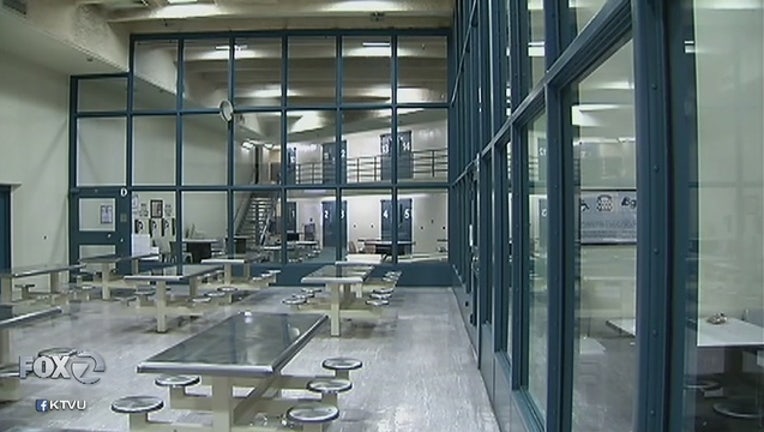California auditor: Santa Rita Jail lacks information on inmate mental health, has surplus of $135M

SACRAMENTO, Calif. - The state auditor on Wednesday issued a lengthy report criticizing three jails in California, singling out Santa Rita Jail for not sharing enough information about the mental health of incarcerated people and having an excess surplus of $135 million, much of which wasn't reported properly.
Specifically, Santa Rita Jail in Dublin "lacks sufficient information" regarding whether inmates have mental illnesses, which hinders their ability to make critical housing and care decisions to keep inmates safe, the audit found. As a result, jail staff is "deprived of critical information needed to make housing and supervision decisions to keep these inmates and others safe."
The auditing team found that deputies at Santa Rita only conduct mental health assessments of inmates who exhibit certain behaviors or disclose a history of mental illness to jail staff -- and that can be a problem.
"Without assessing all inmates, Alameda cannot be sure it is providing the mental health care they need," the audit found, comparing the process to Los Angeles, where jail staff there conducts comprehensive mental health screenings for all jail inmates and mental health providers share relevant information regarding inmates’ mental health history to jail staff.
Howle recommended that Santa Rita should immediately begin conducting mental health screening of all inmates upon admission to the county jail and by June, should develop a process requiring mental health providers to share with jail staff the mental status of all inmates.
The subject of mental illness - and whether inmates are adequately treated for it -- is at the heart of a 2018 class-action lawsuit filed against the Alameda County Sheriff's Office, and the plaintiff's attorneys have been meeting regularly with county counsel to try to remedy some of these issues, and improve conditions, to avoid a trial.
Auditor Elaine Howle submitted her findings to Gov. Gavin Newsom regarding Santa Rita, as well as the jails in Fresno and Los Angeles counties, which she said have increased jail overcrowding.
In addition to the other problems, all three of the jails often lack adequate outdoor and educational facilities to provide certain vocational and rehabilitative programs, her audit found.
Sgt. Ray Kelly, a spokesman for the sheriff, said his office was "extremely cooperative and responsive to the audit."
He referred further comment to County Administrator Susan Muranishi, who did not immediately respond.
Several Alameda County supervisors were also unavailable for comment.

However, in a formal response to the audit, Alameda, Fresno, and Los Angeles counties agreed with some of the recommendations and promised they would take action to implement them. But all three counties disagreed with the audit's interpretation that state law requires them to oversee and report on all public safety realignment accounts.
Howle found that Alameda, Fresno and Los Angeles counties all have not fully reported a total of $1.9 billion of realignment funding sources that are meant to fund public safety and have limited their oversight to only a small portion of the funding. In fact, each county didn't report about 80% of the funding they received to the Corrections Board.
For example, Alameda County has an excess surplus of $135 million; Fresno County has an excess surplus of $79 million; and Los Angeles County has an excess surplus of $1.7 billion, the audit found.
This money could have been spent to improve public safety, Howle said.
Without comprehensive planning and oversight, Howle's team said that counties cannot ensure that their decisions regarding the use of public safety realignment funds are well informed.
On top of that, Howle found that the jails are providing "inconsistent and incomplete information" to the governor and the Legislature each year.
Civil rights organizers and close observers of the jail said they've been trying to call attention to these financial issues for years.
"While realignment funds represent just a tiny portion of the sheriff’s massive overall jail budget, it is clear that even these funds are mismanaged, not transparent and unaccountable," said Jose Bernal, organizing director at the Ella Baker Center for Human Rights in Oakland. "Realignment funds were always intended to fund vital reentry and support services for those who are justice-involved. Of the $333 million in realignment funds that Alameda county received last year, only 16% of this money had any type of oversight. Where did the rest of the $279 million spread over nine separate accounts go? Now more than ever -- if the county is serious about public safety – they need to use these funds to do what they were always intended to do. This means funding vital services in the community like mental health, housing and workforce development."


The subject of whether Santa Rita Jail needs more money or not came up last year, just when coronavirus was wreaking havoc around the globe.
In May 2020, the Alameda County Board of Supervisors approved Sheriff Greg Ahern's request of $318 million over three years to hire more deputies at Santa Rita Jail, over the objection of many community members, including Bernal of the Ella Baker Center, who noted that the money would have been better spent on helping people out of work and without housing during the pandemic.
The state audit is more than a year in the making.
In January 2020, Assemblymember Sydney Kamlager (D-Los Angeles) requested the audit citing the Alameda County Board of Supervisors’ "refusal" to open its own investigation into the sheriff’s department, despite multiple calls for action from local legislators and civil rights activists.
Kamalager's request came about five months after a KTVU investigation revealed that Santa Rita Jail has the highest jail death rate of inmate deaths in the region, including a large majority of incarcerated people who were kept in isolation and ended up dying by suicide.

Lisa Fernandez is a reporter for KTVU. Email Lisa at lisa.fernandez@foxtv.com or call her at 510-874-0139. Or follow her on Twitter @ljfernandez

